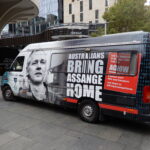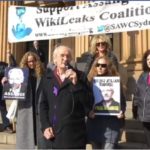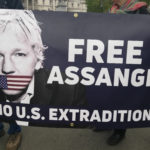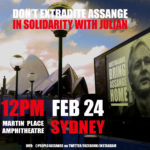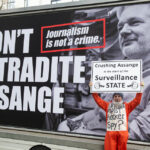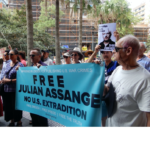“Until We Win”: Assange’s Father John Shipton on the Home Run Tour for Julian
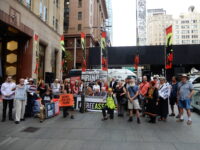
For the past fortnight the Home Run for Julian tour has been weaving its way through regional and suburban Victoria and NSW, towards the nation’s capital.
And along its route, it’s met with supporters to spread the word that Australians want Wikileaks founder Julian Assange returned home.
After over a decade of drawn out detention in the UK, Assange is now incarcerated in London’s Belmarsh prison, pending an appeal of the British court decision not to extradite him to the United States to face multiple espionage charges over his publishing.
The Home Run for Julian speak out tour has been led by Assange’s father John Shipton, along with 3CR journalist and peace campaigner Jacob Grech, the Peace Bus’ Graeme Dunstan and Melbourne for Wikileaks’ Raine Sinclair.
Emblazoned with Julian’s image on its side, the Home Run van parked in Sydney’s Martin Place on 12 March, where it found an ardent group of Wikileaks supporters standing by to lend their voices to the ever-increasing chorus calling for the Townsville-born journalist’s release and return.
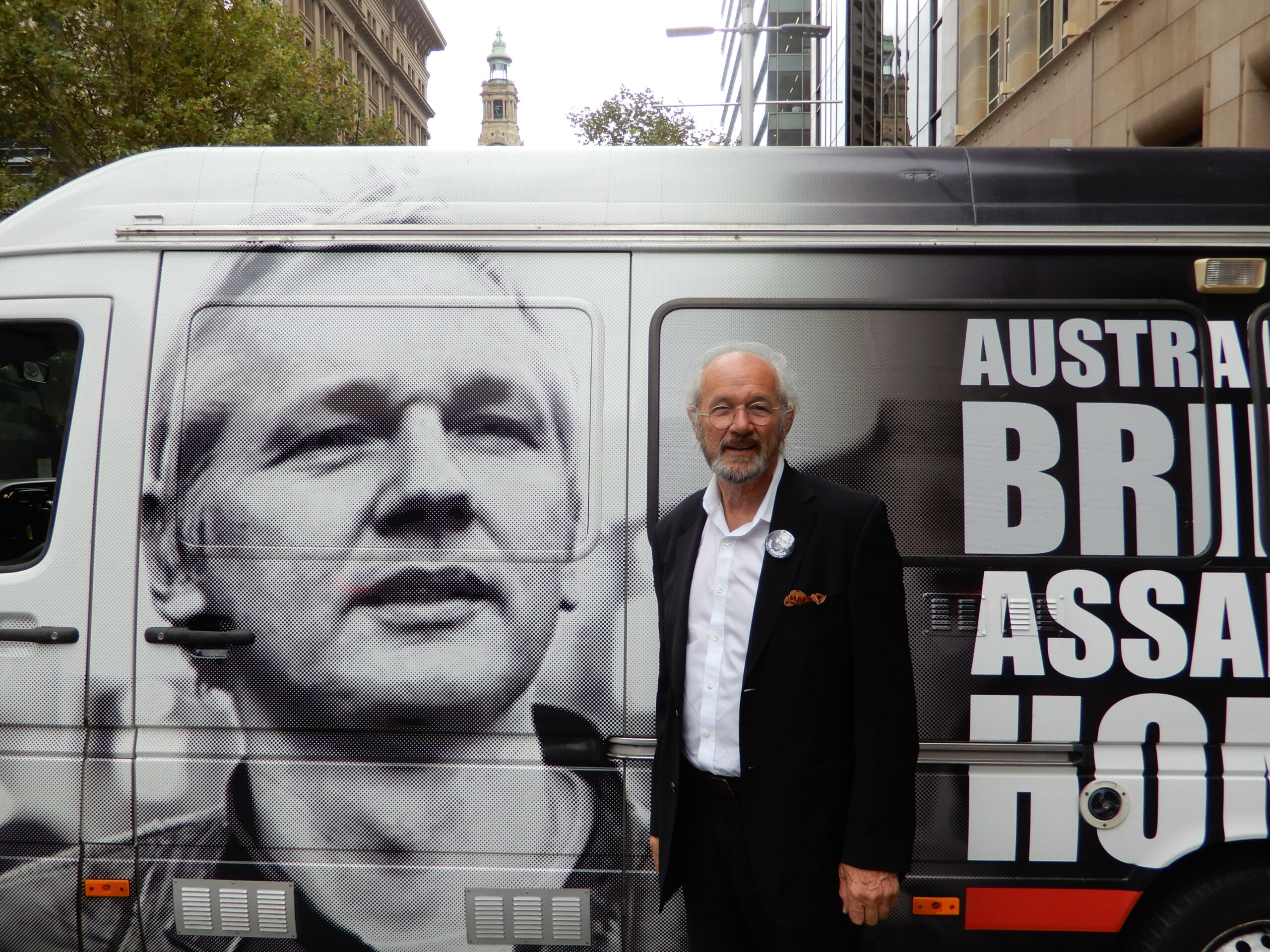
Conveyors of truth
Shipton has been constantly campaigning for his son’s release from Belmarsh prison since he was taken into UK custody in April 2019. After having served a brief sentence over a decade-old breach of bail charge, Assange continues to be remanded in London on behalf of Washington.
Melbourne academic Dr Gideon Polya has calculated 6 to 7 million excess deaths in the Middle East due to western intervention over the last two decades, Shipton told the rally in Sydney’s CBD, adding that these are the crimes his son has exposed.
Shipton pointed to the Australian Bring Julian Assange Home Parliamentary Group as a sign of rising support.
And prior to the rally, he remarked that he was going to be joined by Independent MP Andrew Wilkie at the 15 March Canberra rally, along with renowned whistleblower David McBride and lawyer Bernard Collaery.
Canberra can change this
Veteran journalist and vocal Assange supporter John Pilger couldn’t make it to last Friday’s Martin Place event, but he sent a message stating that when “this struggle is over and Julian is free, the tireless campaigning of John Shipton will have a permanent place in our hearts”.
Pilger also addressed Scott Morrison suggesting that rather than kowtowing to foreign governments, it’s well within the Australian PM’s power to see Assange returned to his homeland. And the journalist added that if the PM doesn’t do this, then he’s “not the leader of a free country”.
Sydney Criminal Lawyers spoke to John Shipton about the support that his son has in high places right across the globe, the Australian parliamentarians that are conveying the message of release to this nation’s executive, and how he’ll continue the fight for release until victorious.
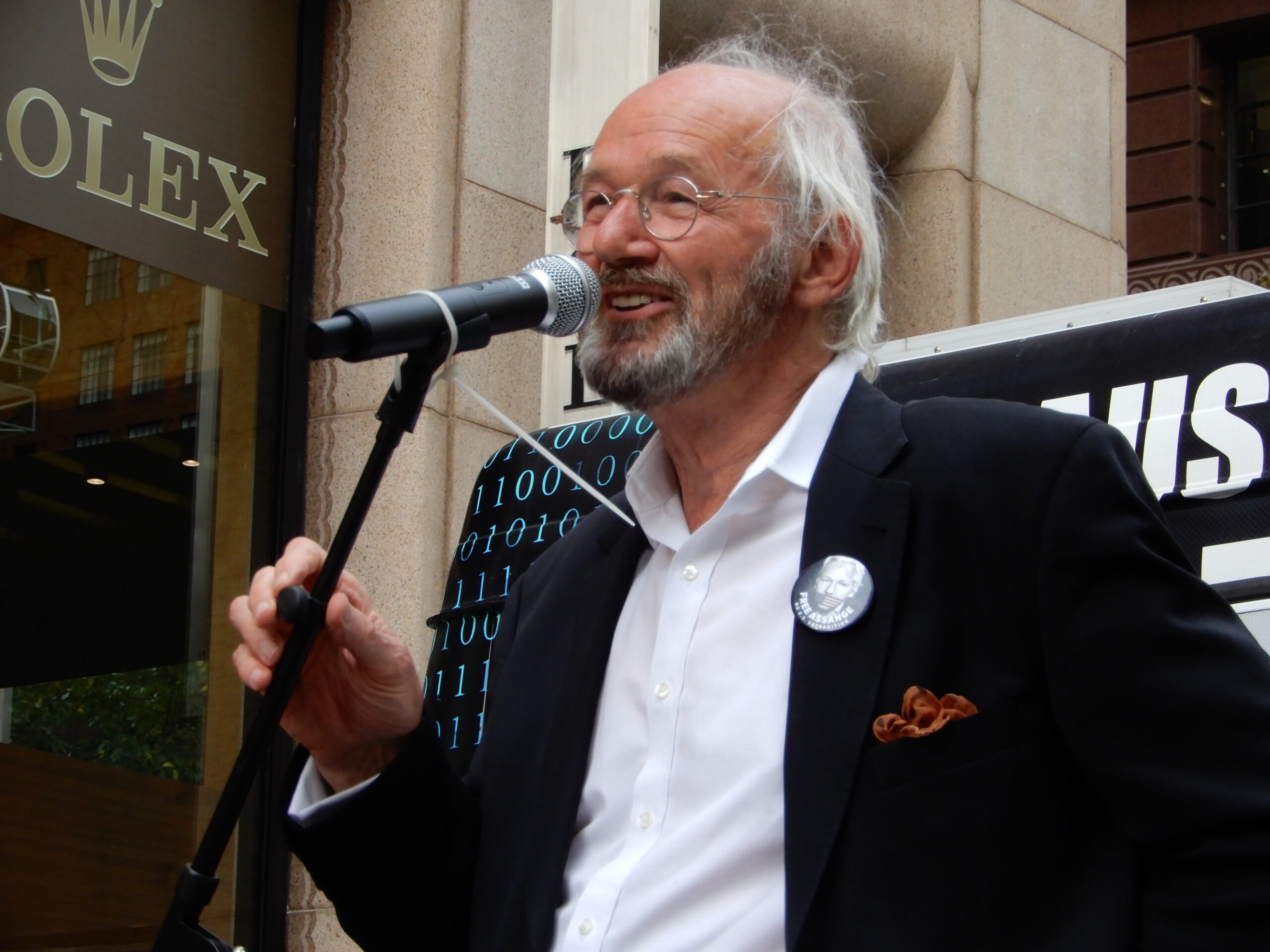
The Home Run for Julian tour departed Melbourne on 26 February. It’s first event was a press freedoms meeting in the town of Castlemaine. And since then, it has made its way across regional Victoria and NSW.
Mr Shipton, how has the tour been going?
It’s been tremendous. At each event, we get a stronger reception. Not that we count on having a lot of people, because all of our supporters use civic media to communicate and share opinions.
What is the support like out there for Julian these days?
It’s great. Twitter has got something like 6 million. I read on Facebook that there are 38 million who occasionally drop in.
There are dozens and dozens of support pages on social media. There are about 81 throughout South America.
The president of Mexico is a supporter. He made that publicly known. I had a cup of tea with Lula, the former president of Brazil. Dilma Rousseff said she’s an ally.
The Bundestag has a cross-party group similar to our cross-party group in Australia. They have a cross-party group in the French parliament.
There are parliamentary groups in the Italian and Spanish parliaments. There are supporters in the Swedish and Norwegian parliaments.
The Council of Europe has passed a motion of support. The chairperson of the Human Rights Commission of the Council of Europe has said that Julian must be freed.
I believe you recently went to the United States?
We went to the United States on 6 to 24 of January. We have friends in the human rights area of the Biden administration, who we passed a letter to.
They took it to the transition team, and we were asked to wait until after inauguration.
We waited until afterwards to send a note in, but they said it will take about three months for it to get to the top of the pile.
So, you’re still waiting?
Yes, we will go back there shortly and make a bit of a foray.
Two months on, what are your thoughts regarding the final findings of the extradition hearing?
It was a show trial. In 2006, prime minister Boris Johnson fought vigorously against David Bermingham’s extradition to the United States.
As mayor of London, Johnson assisted a successful fight against Gary McKinnon’s extradition to the US. Also, Johnson was helpful in the extradition hearing of Lauri Love, which was again successful.
In question time last year, Jeremy Corbyn asked about Julian. And prime minister Johnson made no derogatory comments about him. He said the extradition treaty is lopsided.
The three – McKinnon, Love and Assange – were all refused on the grounds of health. So, that seems to have evolved to an understanding that sending people to the United States is ruinous. It will destroy them.
How is Julian doing at the moment?
Not well.
And lastly, Mr Shipton, what are you expecting to happen from here?
I just take things day-to-day. We do what we can on the day until we win.
Right now, there are 24 parliamentarians in the Australian federal parliament forming the Assange group.
Those parliamentarians keep their ears to the ground and responded to their constituents’ concerns by forming this group and bringing the matter to the executive, saying they want it resolved.
That indicates two things. One, that these are good representatives of the people, with substance, care and conscience.
The other is that there is an upwelling of support and a change of sentiment in Australia, as well as across the western world. As I have indicated to you, every parliament in Europe has supporters.
Yesterday, the Dáil, Irish parliament, passed a motion supporting Assange. The Dáil foreign office is planning to go to the American ambassador and UK ambassador to tell them to fix this matter.
In Germany, there are figures of prominence, such as Sigmar Gabriel, the former foreign minister. He is a supporter.


